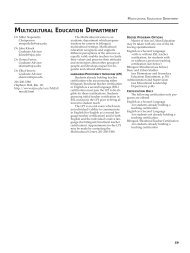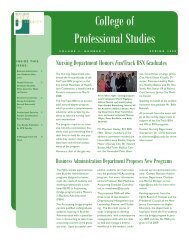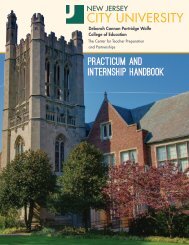MASTER COURSE LIST - New Jersey City University
MASTER COURSE LIST - New Jersey City University
MASTER COURSE LIST - New Jersey City University
Create successful ePaper yourself
Turn your PDF publications into a flip-book with our unique Google optimized e-Paper software.
ACADEMIC HONORS<br />
Students with a semester average of 3.50 or<br />
better (minimum of 12 credits of computable<br />
grades) will be placed on the Dean’s List.<br />
Students who have a cumulative average of<br />
3.65 or better as they begin the spring semester<br />
at the <strong>University</strong> will be officially identified for<br />
honors in the Commencement program and<br />
designated as follows:<br />
3.65-3.79 cum laude<br />
3.80-3.89 magna cum laude<br />
3.90-4.00 summa cum laude<br />
based on a minimum of 32 credit hours in<br />
residence at <strong>New</strong> <strong>Jersey</strong> <strong>City</strong> <strong>University</strong>. Only<br />
graduates with a cumulative average of 3.65<br />
or higher will have an honors notation on their<br />
permanent records.<br />
ACADEMIC STANDARDS<br />
1. Academic standing is determined by a student’s<br />
cumulative G.P.A. Failure to attain minimum<br />
G.P.A. levels will lead to suspension, probation<br />
or academic dismissal from the <strong>University</strong>.<br />
2. A student will be placed on probation for the<br />
next semester for which the student enrolls<br />
if the cumulative grade point average falls<br />
below the following levels:<br />
1.60 cumulative G.P.A. after a minimum<br />
of 13 credit hours attempted<br />
1.75 cumulative G.P.A. after a minimum<br />
of 24 credit hours attempted<br />
1.85 cumulative G.P.A. after a minimum<br />
of 48 credit hours attempted<br />
2.00 cumulative G.P.A. after a minimum<br />
of 72 credit hours attempted<br />
2.00 cumulative G.P.A. is required for<br />
graduation<br />
A. A student on probation may not enroll for<br />
more than 13 credits during a semester or<br />
the 11 credits maximum allowed in the<br />
combined summer sessions. Students can<br />
enroll in Summer sessions.<br />
B. A student on probation who achieves a<br />
semester average of 2.00 or higher during<br />
the probationary semester may continue with<br />
his/her studies.<br />
C. Probation is removed when the student’s<br />
cumulative grade point average reaches the<br />
appropriate level.<br />
3. When a student fails to meet the prescribed<br />
academic standards at the mid-year point,<br />
s/he will be notified as to his/her continued<br />
probationary status and given an academic<br />
warning. Depending upon the student’s C.G.P.A.<br />
at the end of the academic year, the Office of<br />
the Dean of Students may implement additional<br />
sanctions (continued probation, suspension,<br />
and/or dismissal).<br />
4. At the end of the spring semester, a student<br />
who has been on probation for two consecutive<br />
semsters or more and who receives a semester<br />
C.G.P.A. lower than 2.00 maybe suspended or<br />
dismissed from the <strong>University</strong>.<br />
5. Any appeal of this suspension must be made<br />
to the Dean of Students within two weeks of<br />
ACADEMIC REGULATIONS & POLICIES<br />
receipt of the official notice by completing the<br />
appeals application available in the Office<br />
of the Dean of Students, Michael B. Gilligan<br />
Student Union, Room 127 or online at http://<br />
web.njcu.edu/sites/deanofstudents/Uploads/<br />
appeal_application_packet.pdf. The Academic<br />
Appeals Committee, will review the appeal<br />
and make a recommendation to the Dean.<br />
The decision of the Dean of Students is final.<br />
6. Any student who is suspended from the<br />
<strong>University</strong> may not be considered for<br />
readmission for at least one calendar year<br />
after the date of suspension.<br />
7. Any reinstated student who does not maintain<br />
a semester average of 2.0 or higher will be<br />
dismissed for a final time.<br />
8. The academic dismissal is final; it cannot be<br />
appealed; and the student cannot apply for<br />
readmission to the <strong>University</strong> for the future.<br />
TRANSFER STUDENT<br />
GRIEVANCE/APPEALS<br />
In accordance with the Comprehensive Statewide<br />
Transfer Agreement* (hereafter known as the<br />
“Agreement”), A transfer student can appeal a<br />
decision that he/she believes to be inconsistent<br />
with the Agreement.<br />
NOTE: Neither the Agreement nor the<br />
accompanying appeals procedure initiate a request<br />
for course substitutions. Students wishing to make<br />
such a request must file a “Request to Substitute<br />
General Studies Area Requirements” form.<br />
Appeals Procedure<br />
Appeals must include the reason for appeal as<br />
well as all supporting documentation verifying<br />
course credit and placement.<br />
The transfer student must file a written complaint<br />
with the Director of The <strong>University</strong> Advisement<br />
Center within 30 days of any evaluation decision<br />
that the student is disputing: jduff@njcu.edu.<br />
Upon receipt of the Director’s decision, which is<br />
due to the student within 15 days of receipt of the<br />
complaint, the student may appeal directly to the<br />
Vice President for Academic Affairs within ten<br />
days. The Vice President’s decision is final and<br />
is due to the student within ten days of receipt.<br />
All decisions will be communicated via the student’s<br />
NJCU e-mail and mailing addresses. Students<br />
should have a GothicNet ID and updated mailing<br />
address prior to submitting the complaint.<br />
ACADEMIC GRIEVANCE/APPEAL<br />
PROCEDURES<br />
(Effective spring 2004)<br />
To resolve grievances regarding grading, course<br />
requirements, attendance, academic integrity,<br />
and other academically-related complaints:<br />
Step 1. Meet and discuss the complaint with the<br />
faculty member involved to resolve the situation<br />
within 45 days of the last day of the semester<br />
during which the grievance took place. At the<br />
conclusion of the meeting, the faculty member<br />
will inform the student of a decision.<br />
Step 2. The student may submit a written appeal<br />
to the faculty member within 10 calendar days<br />
of the date of receipt of the written appeal.<br />
Should the faculty member fail to respond within<br />
10 calendar days, the student may submit a<br />
written appeal to the next level of review, the<br />
department chairperson, with ten calendar days.<br />
Step 3. Written appeal to the appropriate<br />
department chairperson within 10 calendar<br />
days of notification of a decision pursuant to<br />
the previous step or upon failure of the faculty<br />
member to respond within the prescribed 10<br />
calendar days.<br />
Step 4. Written appeal to the appropriate Academic<br />
Dean within ten (10) calendar days of notification<br />
of a decision pursuant to the previous step.<br />
The appropriate dean shall provide the student with<br />
a written decision within ten (10) calendar days of<br />
receipt of the appeal from Step 3.<br />
Step 5. Written appeal to the <strong>University</strong> Senate<br />
Student Affairs Committee within ten (10)<br />
calendar days of notification of a decision<br />
pursuant to the previous step.<br />
Grievances that are not resolved at the Dean’s<br />
level may be referred to the Student Affairs<br />
Committee of the <strong>University</strong> Senate. Within<br />
20 days of receipt of a written appeal from a<br />
student, the Committee shall determine that the<br />
appeal has basis in fact; inform the complainant<br />
of the legal and administrative limitations of<br />
the Committee in resolving grievances; and<br />
determine that all normal avenues of appeal<br />
resolution between the parties involved and the<br />
applicable department chair and dean have<br />
been exhausted. The Committee may choose to<br />
meet with the parties involved. The Committee<br />
will provide notice of its decision to the Vice<br />
President for Academic Affairs, who will render<br />
a final decision within 30 calendar days of<br />
receiving the Committee’s recommendation.<br />
FINAL APPEAL<br />
Only expulsion cases may be appealed to the<br />
President. The student will have ten calendar<br />
days from the date of the Vice President’s<br />
decision to file a written appeal with the<br />
President. The President shall render a final<br />
decision within 20 calendar days of receiving<br />
the appeal. The President’s decision is final and<br />
there is no further recourse at the <strong>University</strong>.<br />
ADVISORS<br />
First-semester freshmen, and new transfer<br />
students, undeclared/unclassified students will<br />
be assigned to a general studies advisor by the<br />
<strong>University</strong> Advisement Center. They will report<br />
to Vodra Hall, Room 101 for advisement. Each<br />
student must meet with his/her advisor prior to<br />
registration.<br />
1. Students accepted into a major report to their<br />
major department for advisement.<br />
2. OSP students report to Vodra Hall, 2 nd floor.<br />
3. TLC Students report to Hepburn Hall, Room<br />
113 for advisement.<br />
4. Students receiving V.A. educational benefits<br />
13<br />
2014_UG_MCL_fallv4.indd 13<br />
9/23/13 5:01 PM


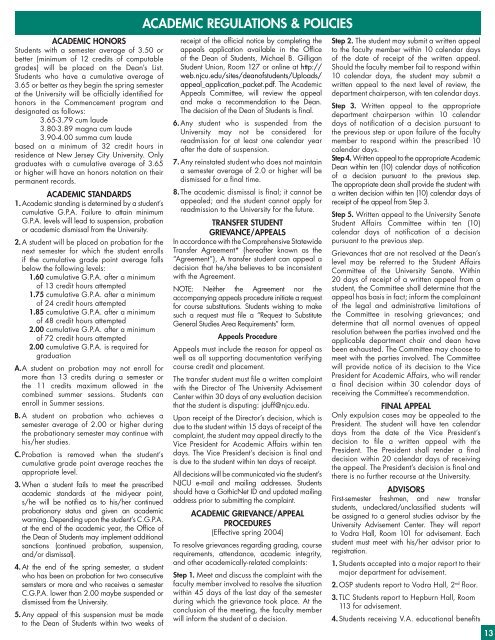
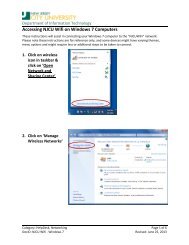
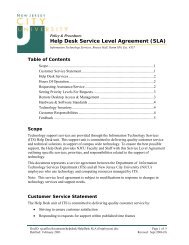




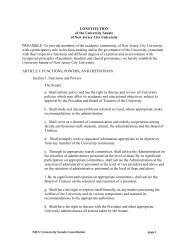

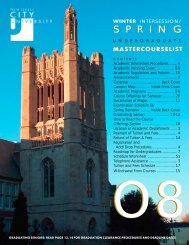
![UACHS 9th English Unit- Feed[1] - New Jersey City University](https://img.yumpu.com/46563190/1/190x245/uachs-9th-english-unit-feed1-new-jersey-city-university.jpg?quality=85)
